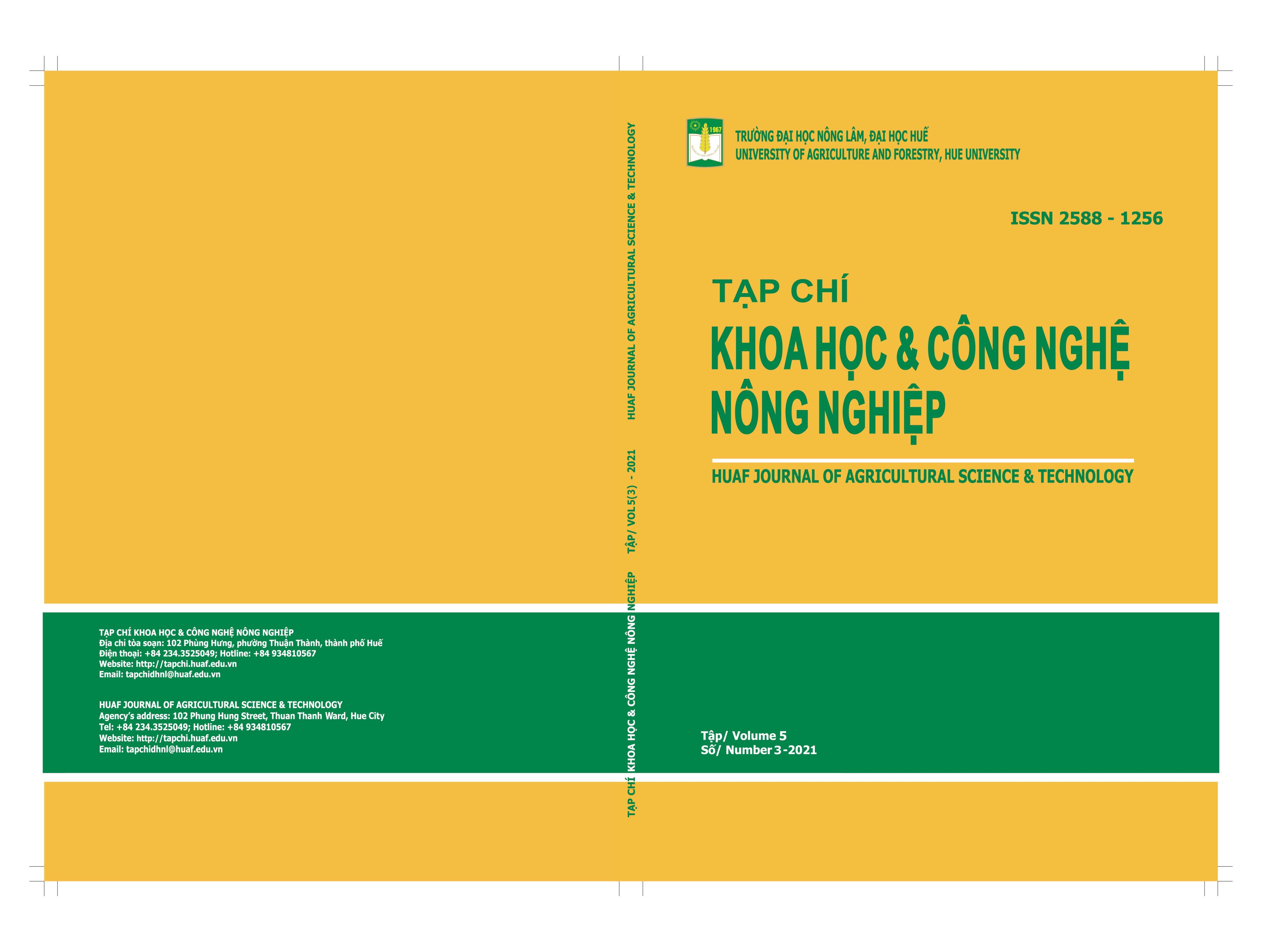##plugins.themes.huaf_theme.article.main##
Tóm tắt
Nghiên cứu được thực hiện nhằm đánh giá ảnh hưởng của việc bổ sung vi khuẩn Streptomyces DH3.4 lên chất lượng nước, vi khuẩn đường ruột, enzyme tiêu hóa và tăng trưởng của tôm thẻ chân trắng (Litopenaeus vannamei). Tôm thẻ chân trắng với trọng lượng trung bình 0,48 ± 0,01 g được chọn để bố trí thí nghiệm với 4 nghiệm thức, mỗi nghiệm thức với 3 lần lặp lại bao gồm (i) Tôm được cho ăn thức ăn không bổ sung khuẩn (Đối chứng) và thức ăn có bổ sung vi khuẩn Streptomyces DH3.4 tương ứng với 3 mật độ (ii) 106, (iii) 107 và (iv) 108 CFU/kg trong 63 ngày. Kết quả cho thấy các thông số chất lượng nước bao gồm nhiệt độ, pH, DO, COD, TSS, độ kiềm, TAN và N-NO2- ở các nghiệm thức bổ sung khuẩn và đối chứng không có sự chênh lệch đáng kể. Mật độ vi khuẩn Streptomyces sp. trong ruột tôm ở nhóm bổ sung vi khuẩn cao hơn có ý nghĩa so với đối chứng. Nghiệm thức bổ sung vi khuẩn Streptomyces DH3.4 ở mật độ 107 và 108 CFU/kg giúp giảm đáng kể mật độ tổng khuẩn Vibrio sp. trong ruột tôm. Các enzyme tiêu hóa như α-amylase, β-galactosidase, protease và Leu-aminopeptidase ở nhóm bổ sung vi khuẩn Streptomyces DH3.4 đạt hoạt tính cao nhất ở cả hai nhóm bổ sung mật độ 107 và 108 CFU/kg. Tăng trưởng về khối lượng (WG), tốc độ tăng trưởng tương đối (DWG) và tốc độ tăng trưởng tuyệt đối (SRG) về khối lượng khác biệt không đáng kể giữa các nghiệm thức. Tuy nhiên, tỉ lệ sống, sinh khối của tôm và chỉ số FCR ở các nghiệm thức bổ sung Streptomyces DH3.4 được cải thiện đáng kể, đặc biệt là nghiệm thức bổ sung vi khuẩn Streptomyces DH3.4 ở mật độ 107 CFU/kg.
ABSTRACT
The present study aimed to evaluate the effect of dietary supplementation of Streptomyces DH3.4 on water quality, intestinal bacteria, digestive enzyme activities and growth performance of whiteleg shrimp (Litopenaeus vannamei). Shrimp with initial weight of 0.48 ± 0.01g were designed in 4 treatments with 3 replicates including (i) Shrimp fed a basic diet without bacteria supplementation (control group) and 3 Streptomyces DH3.4 supplementation diets at dose of (ii) 106, (iii) 107 and (iv) 108 CFU/kg for 63 days. The results showed that the water quality parameters including temperature, pH, DO, COD, TSS, total alkalinity, TAN and N-NO2- were not significantly different among treatments. Streptomyces counts in the digestive tract of shrimp fed diets containing Streptomyces DH3.4 were significantly higher than the control. Furthermore, supplementation of 107 and 108 CFU/kg decreased considerably total Vibrio counts in the shrimp’s digestive tract. The digestive enzymes such as α-amylase, β-galactosidase, protease and Leu-aminopeptidase were improved and reached the highest activities in Streptomyces DH3.4 supplementation diet treatments of 107 and 108 CFU/kg. Growth performance parameters regarding weight gain (WG), daily weight gain (DWG) and specific growth rate (SRG) were not significantly different among treatments. However, survival rates, shrimp biomass and FCR in diets containing Streptomyces DH3.4 were improved significantly, especially in 107 CFU/kg treatment.
